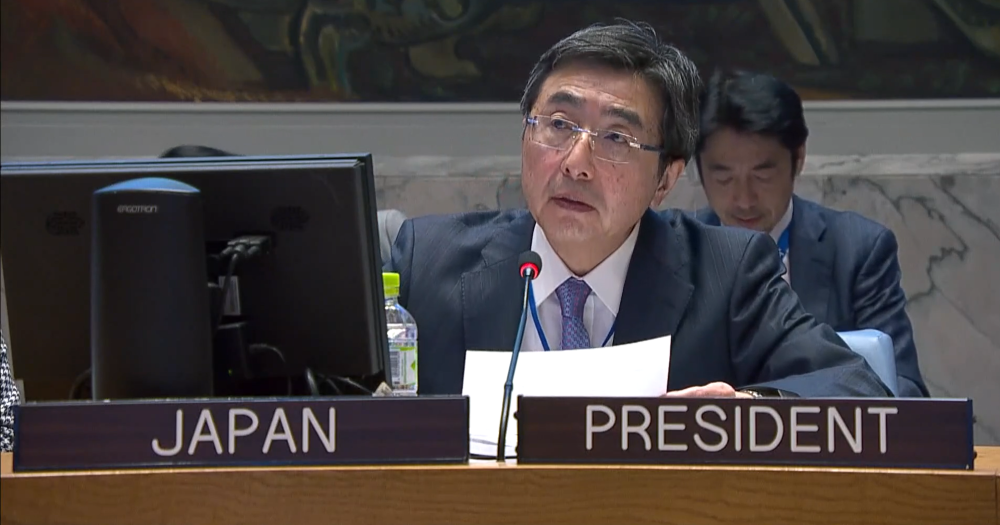国連安保理公開討論「平和構築と平和の持続:強靱性強化に向けた人への投資」における石兼大使ステートメント
令和5年1月26日

I thank Deputy Secretary-General Amina Mohammed, Ambassador Muhammad Abdul Muhith, and Ms. Diago Ndiaye for their informative and insightful briefings.
In every corner of the world, we face increasingly complex challenges which make peace vulnerable and fragile. Each situation is unique and has its own context. Each should equally receive close and constant attention.
In particular, we should raise awareness of various emerging risk multipliers. Those requiring our close attention include food and energy insecurity, health emergencies, climate change, and human rights violations and abuses, to name a few. We have recently witnessed how easily peace receded and the humanitarian situation deteriorated in some countries and regions, despite strenuous efforts over time. An integrated and tailored approach to build and sustain peace, consistent with emerging risks, is more important than ever.
To take on the daunting challenges of our time, how can we further strengthen the Council’s engagement? Let me share the following two points.
First, the Council should play the leading role to achieve sustainable peace through establishing resilient institutions by investing in people.
It is crucial that institutions are established to ensure that people can live in a secure environment based on the rule of law. Institutions should be able to offer basic socio-economic services and development to protect and empower people so that they can cope with multifaceted challenges. Services such as health care and education are fundamental for establishing a resilient society and thereby ensuring human security, as we just heard from Ms. Ndiaye. Such a society will nurture the stronger trust of people in their government and the communities they belong to. The solidarity built on this trust is the indispensable ingredient for sustaining peace.
Investment in people in all segments of society is also crucial. In order for institutions and society to be resilient, all national stakeholders, including women and youth, should be able to proactively participate in peacebuilding. We all have to keep in mind that the people we invest in should be the agents to shape and promote more effective, accountable, and resilient institutions and societies.
The Council can strengthen the humanitarian-development-peace (HDP) nexus in the mandates of UN peace operations by articulating it clearly in the resolutions. The Council can also advance such efforts by further promoting inclusivity through thematic agendas such as Women, Peace, and Security (WPS) and Youth, Peace, and Security (YPS). We believe the concept of human security should be mainstreamed in the UN’s work to help promote an integrated and coherent approach across all relevant actors. For its part, Japan’s New Approach for Peace and Stability in Africa (NAPSA) has placed its focus on institution and capacity building.
Second, the Council should make more effective use of other UN organs, particularly the Peacebuilding Commission (PBC). Here are some tangible proposals for enhancing the PBC’s advisory role to the Council.
It is commendable that the PBC’s briefings and written advice to the Council have dramatically increased over the past year under the leadership of Bangladesh as the PBC Chair and of Kenya as the informal coordinator between the two bodies. However, the communication channel between the two bodies has remained a one-way street. The Council should make substantial efforts to provide feedback to the PBC. Japan advocates for convening a meeting where all PBC and Security Council members gather and engage, possibly through informal interactive dialogue.
The Council should also seek and reflect the PBC's advice on the occasion of mandate renewals of UN peacekeeping operations and special political missions. For instance, the Council can request the PBC to provide advice before a penholder starts working on a draft mandate resolution and can request the head of a UN peace operation to brief the PBC to help it develop advice. The Secretariat should be further strengthened to support the PBC’s work.
It is our firm belief that peacebuilding through resilient institutions is the best way to prevent conflict and violence. The Security Council and the PBC can expand their roles in this field to convey necessary information and issue alerts before conflicts arise.
The process to develop a New Agenda for Peace is now underway. This is a historic opportunity for the UN, Member States and all other partners to rebuild a common vision on peacebuilding and conflict prevention and upgrade the UN’s toolbox to that end. We should mobilize our collective wisdom now.
Let me conclude by reiterating Japan’s unwavering commitment to promoting the peacebuilding and sustaining peace efforts in the UN and beyond.
